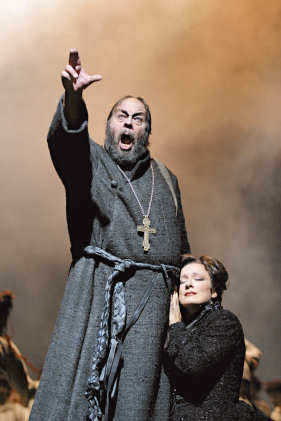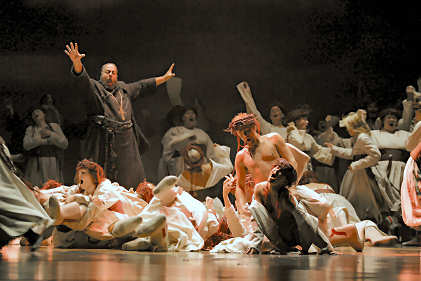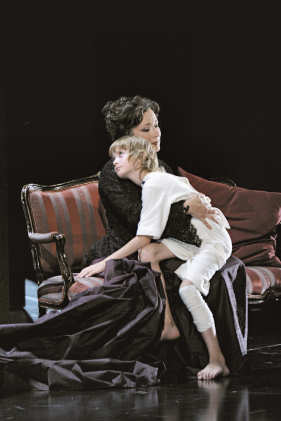|
Editor: Marc Bridle
Webmaster: Len Mullenger
|
Seen and Heard International
Opera Review
Any doubts I might have had (and there really have never been many) about Finland being the most musical nation in the world, were dispelled once for all last week. As I walked from my hotel to Helsinki's opera house for this performance, a street busker was playing Elvis on a battered Wagner tuba: somehow the ideal preparation for a memorable evening.
Rasputin had something of a mixed reception after its première in 2003. Although compared more than favourably with Deborah Drattel's Nicholas and Alexandra which explored the same story in Los Angeles, some critics complained that Rautavaara's music sounded 'old-fashioned' and that his portrayal of the Russian healer was insufficiently sinister. Most admitted however, that this was a true grand opera (it is three hours long and has twenty five soloists) and that the composer's use of his own libretto was a well-founded choice.
Well, I thought better of it than some. Much
better in fact, because the work is continuously melodious and
full of dramatic contrast, and it deliberately presents Rasputin's
character as a paradox. The contrast between the monk's exploitative
belief that redemption from sin can come about only through sinning,
especially where women are involved, and his equally strong conviction
that he was blessed with genuine powers as a healer, is explored
thoughtfully and with great care. This Rasputin reminded me of
G.I.Gurdjieff as much as anyone: manipulative on occasions, mistrusted
by many, but also immensely charismatic and clearly a gifted though
idiosyncratic healer. It seems at least possible after this portrayal
(despite opinions formed from photographs of the real Rasputin)
that the monk's reputation as the repository of evil is far too
one-dimensional. Cognitive dissonance (the discomfort we feel
when confronted by emotionally incompatible contrasts in the behaviour
of others) usually results in stereotyping after all.
The role of Rasputin was written specifically for Matti Salminen, a master of the Russian bass repertoire in addition to his Wagnerian roles. It's a big sing: Salminen is on stage almost continually and despite the fact that he has only one major 'aria', the Siberia Monologue in Act I, the work must be as demanding vocally as either Boris or Khovanshchina. Salminen is his usual magnificent self throughout and his huge voice is as flexible as ever even though he is sixty this year. This is tour de force singing from one of the world's great basses.
Rautavaara's music for this opera does have an authentically Russian flavour. It has a large chorus as well as abundant soloists and the multi-layered score is clearly reminiscent of Mussorgky on occasions. What is particularly impressive however, is that the vocal writing is beautifully crafted. Accustomed as many of us have become, to new opera with decidedly unmusical (not to say dreary) lines for the singers, the skill with which Rautavaara writes manageable, interesting and attractive music for every type of voice, is a genuine delight to the ear. The skill applies equally to both solo writing and to the many ensembles; this score provides a real (and too rare) sense that voices and orchestra are intended as equal partners in a unified sound world. Everything is done with so much care here, that there is no sense at all in this music that the singing is merely an afterthought.
The story is told directly and opens with the Tsarevitch suffering an episode of haemophilia. Rasputin heals the boy successfully enough to impress the Empress and gradually his influence at the court increases. Jealousy from other courtiers, fuelled by Rasputin's preaching his message about redemption from sin and his penchant for orgiastic religious rituals, results in a plot to murder him. After one failed attempt to kill him by shooting, Rasputin dies from combined poisoning and further gunshot wounds.
The final scene of the opera, after the murder, uses text from an authentic letter in which Rapustin predicted his own death and warned that if he were to be killed by members of the nobility, the end of the Russian Empire and the Romanov family would surely follow. A huge back-projected image of the monk is seen as the Bolsheviks enter the palace and the Empress cries out to God in despair.
The set is built on FNO's turntable stage and uses Russian Orthodox icons mounted on bare walls to suggest time both before and after the Revolution. Kimmo Viskari's period costumes are typical of Imperial Russia and there is no attempt whatever to kit the production out with inappropriate symbolism or anachronistic 'significance.' It's a simple but compelling visual presentation aided in no small measure by an excellent lighting plot from Claude Naville.
Under Mikko Franck's expert musical direction, not a single note was misplaced by either orchestra or chorus, and the multitude of soloists were all in excellent form. In addition to Salminen's masterly Rasputin, we were also treated to particularly fine singing from Lilli Paasikivi (Empress Alexandra), from Jorma Hynninen (Tsar Nikolai) and from Jyrki Anttila (Felix Yusupov.) The rest of the cast were in equally good fettle, and once again FNO showed that its capacity to stage a major production using only Finnish singers is so remarkable an achievement that the company really must rate as one of the best in the world these days. As a bonus however, the production has also been recorded on DVD by Ondine (ODV4002). It's already on sale in Finland and should be available elsewhere shortly. For anyone who can't get to Helsinki (or to St. Petersburg where FNO will stage the production soon), the discs will serve as a fine introduction to a remarkable work and a first-rate opera company.
Bill Kenny
Back to the Top Back to the Index Page
|
| ||
|
||||





